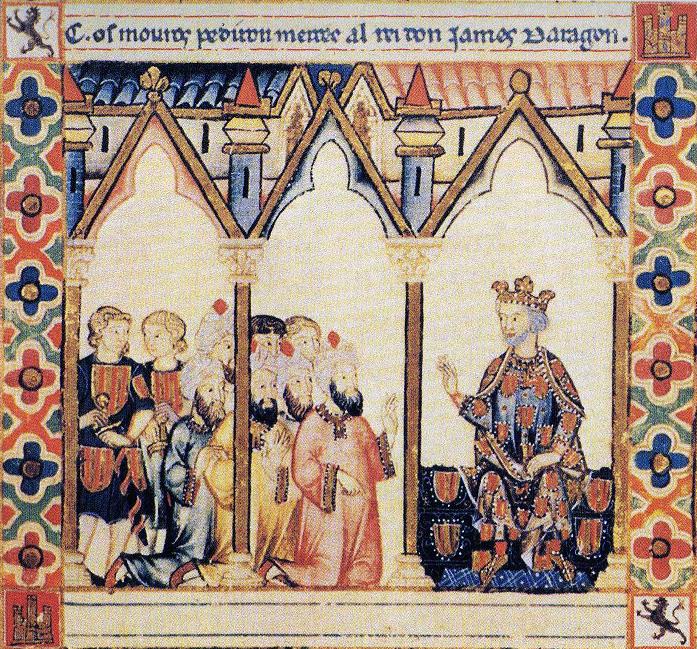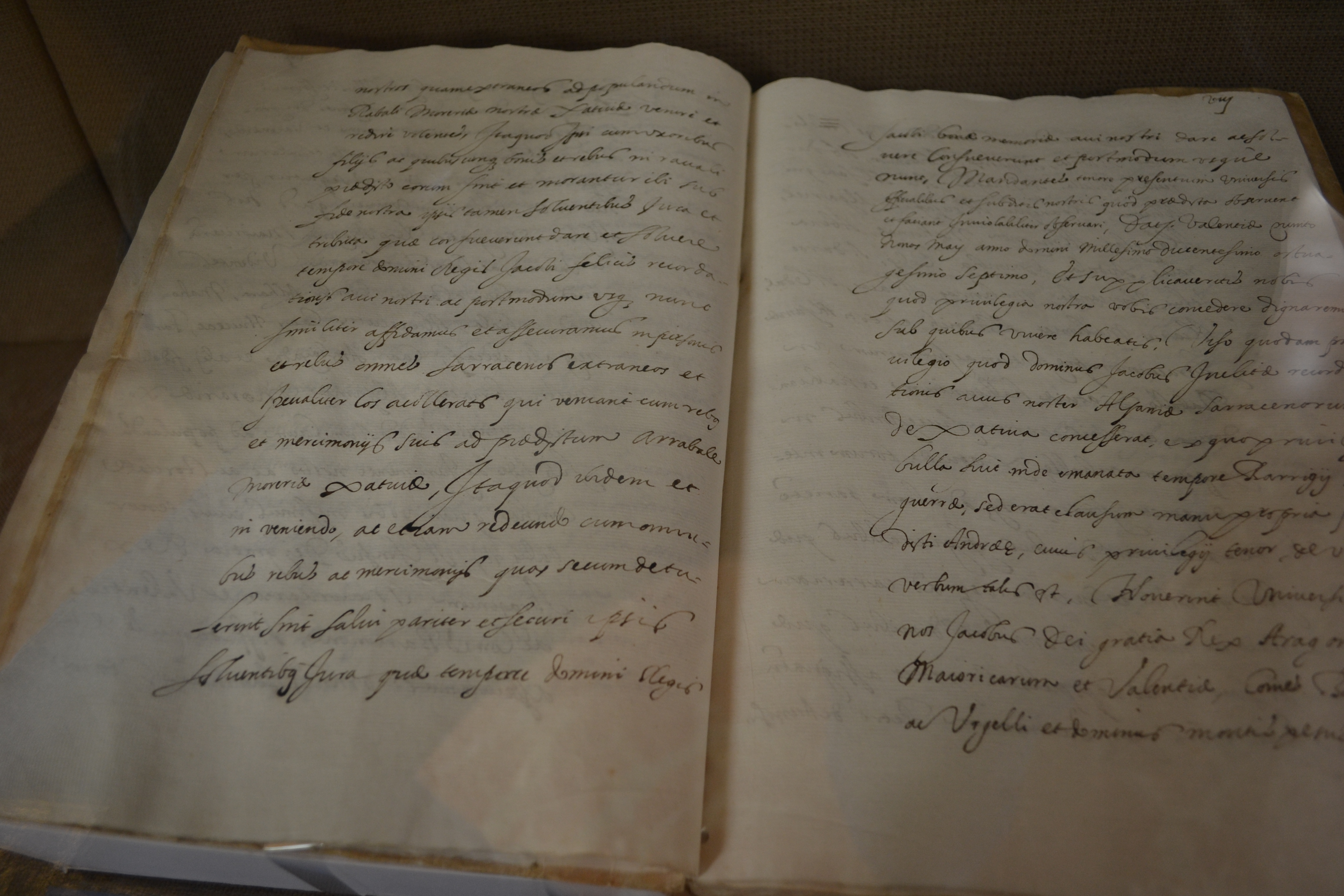|
Treaty Of Xàtiva
The Treaty of Xàtiva was signed in 1244 between the Christians, Christian King James I of Aragon and the Muslim commander Abu Bakr in Xàtiva in the Iberian Peninsula. The treaty laid out generous terms of surrender of the Moors to the Christians, where the Moors were allowed to hold the Xativa Castle for two years before handing it over to the Christian monarchy. See also *List of treaties References Warfare of the Middle Ages Treaties of al-Andalus Reconquista treaties, Xativa Surrenders, Xativa 1240s treaties, Jativa Treaties of the Crown of Aragon, Xativa 1244 in Europe 13th century in Aragon {{Al-Andalus-stub ... [...More Info...] [...Related Items...] OR: [Wikipedia] [Google] [Baidu] |
Christians
Christians () are people who follow or adhere to Christianity, a monotheistic Abrahamic religion based on the life and teachings of Jesus Christ. The words ''Christ'' and ''Christian'' derive from the Koine Greek title ''Christós'' (Χριστός), a translation of the Biblical Hebrew term ''mashiach'' (מָשִׁיחַ) (usually rendered as ''messiah'' in English). While there are diverse interpretations of Christianity which sometimes conflict, they are united in believing that Jesus has a unique significance. The term ''Christian'' used as an adjective is descriptive of anything associated with Christianity or Christian churches, or in a proverbial sense "all that is noble, and good, and Christ-like." It does not have a meaning of 'of Christ' or 'related or pertaining to Christ'. According to a 2011 Pew Research Center survey, there were 2.2 billion Christians around the world in 2010, up from about 600 million in 1910. Today, about 37% of all Christians live in the Am ... [...More Info...] [...Related Items...] OR: [Wikipedia] [Google] [Baidu] |
James I Of Aragon
James I the Conqueror ( es, Jaime el Conquistador, ca, Jaume el Conqueridor; 2 February 1208 – 27 July 1276) was King of Aragon and Lord of Montpellier from 1213 to 1276; King of Majorca from 1231 to 1276; and Valencia from 1238 to 1276 and Count of Barcelona. His long reign—the longest of any Iberian monarch—saw the expansion of the Crown of Aragon in three directions: Languedoc to the north, the Balearic Islands to the southeast, and Valencia to the south. By a treaty with Louis IX of France, he achieved the renunciation of any possible claim of French suzerainty over the County of Barcelona and the other Catalan counties, while he renounced northward expansion and taking back the once Catalan territories in Occitania and vassal counties loyal to the County of Barcelona, lands that were lost by his father Peter II of Aragon in the Battle of Muret during the Albigensian Crusade and annexed by the Kingdom of France, and then decided to turn south. His great part i ... [...More Info...] [...Related Items...] OR: [Wikipedia] [Google] [Baidu] |
Muslim
Muslims ( ar, المسلمون, , ) are people who adhere to Islam, a monotheistic religion belonging to the Abrahamic tradition. They consider the Quran, the foundational religious text of Islam, to be the verbatim word of the God of Abraham (or '' Allah'') as it was revealed to Muhammad, the main Islamic prophet. The majority of Muslims also follow the teachings and practices of Muhammad ('' sunnah'') as recorded in traditional accounts (''hadith''). With an estimated population of almost 1.9 billion followers as of 2020 year estimation, Muslims comprise more than 24.9% of the world's total population. In descending order, the percentage of people who identify as Muslims on each continental landmass stands at: 45% of Africa, 25% of Asia and Oceania (collectively), 6% of Europe, and 1% of the Americas. Additionally, in subdivided geographical regions, the figure stands at: 91% of the Middle East–North Africa, 90% of Central Asia, 65% of the Caucasus, 42% of Southeast As ... [...More Info...] [...Related Items...] OR: [Wikipedia] [Google] [Baidu] |
Xàtiva
Xàtiva (, es, Játiva ) is a town in eastern Spain, in the province of Valencia, on the right (western) bank of the river Albaida and at the junction of the Valencia–Murcia and Valencia Albacete railways. It is located 25 km west of the Mediterranean Sea. During the Al-Andalus Islamic era, Arabs brought the technology to manufacture paper to Xàtiva. In the 12th century, Xàtiva was known for its schools, education, and learning circles. Islamic scholar Abu Ishaq al-Shatibi's last name refers to Xàtiva where he lived and died. After the Reconquista by Northern Christian kingdoms and the following Christian repopulation, the city became the cradle of one of the most powerful and controversial families of the Renaissance, the House of Borgia, which produced Popes like Callixtus III (Alfonso de Borgia) and Alexander VI (Rodrigo de Borgia). History Xàtiva (''Saetabis'' in Latin) was famous in Roman times for its linen fabrics, mentioned by the Latin poets Ovid and C ... [...More Info...] [...Related Items...] OR: [Wikipedia] [Google] [Baidu] |
Iberian Peninsula
The Iberian Peninsula (), ** * Aragonese and Occitan: ''Peninsula Iberica'' ** ** * french: Péninsule Ibérique * mwl, Península Eibérica * eu, Iberiar penintsula also known as Iberia, is a peninsula in southwestern Europe, defining the westernmost edge of Eurasia. It is principally divided between Spain and Portugal, comprising most of their territory, as well as a small area of Southern France, Andorra, and Gibraltar. With an area of approximately , and a population of roughly 53 million, it is the second largest European peninsula by area, after the Scandinavian Peninsula. Name Greek name The word ''Iberia'' is a noun adapted from the Latin word "Hiberia" originating in the Ancient Greek word Ἰβηρία ('), used by Greek geographers under the rule of the Roman Empire to refer to what is known today in English as the Iberian Peninsula. At that time, the name did not describe a single geographical entity or a distinct population; the same name was us ... [...More Info...] [...Related Items...] OR: [Wikipedia] [Google] [Baidu] |
Moors
The term Moor, derived from the ancient Mauri, is an exonym first used by Christian Europeans to designate the Muslim inhabitants of the Maghreb, the Iberian Peninsula, Sicily and Malta during the Middle Ages. Moors are not a distinct or self-defined people. The 1911 ''Encyclopædia Britannica'' observed that the term had "no real ethnological value." Europeans of the Middle Ages and the early modern period variously applied the name to Arabs and North African Berbers, as well as Muslim Europeans. The term has also been used in Europe in a broader, somewhat derogatory sense to refer to Muslims in general,Menocal, María Rosa (2002). ''Ornament of the World: How Muslims, Jews and Christians Created a Culture of Tolerance in Medieval Spain''. Little, Brown, & Co. , p. 241 especially those of Arab or Berber descent, whether living in Spain or North Africa. During the colonial era, the Portuguese introduced the names " Ceylon Moors" and "Indian Moors" in South Asia and Sri ... [...More Info...] [...Related Items...] OR: [Wikipedia] [Google] [Baidu] |
Xativa Castle
Xativa Castle ( es, Castillo de Játiva; ca-valencia, Castell de Xàtiva) is a castle located in the city of Xàtiva near Valencia, Spain. It consists of a twin fortification divided between the older "Castillo Menor" (minor castle), built on the Iberian and Roman remains of the site, and the more recent "Castillo Mayor" (main castle), built during the medieval period. It sits at a height of 310 meters above the modern-day city. History The fortress is strategically located on the ancient roadway Via Augusta leading from Rome across the Pyrenees and down the Mediterranean coast to Cartagena and Cádiz. The minor castle was originally a Celtiberian stronghold and was then taken by the Carthaginians in the third century BC. It is said to be the place where Hannibal planned the conquest of the Roman city of Saguntum, as well as where his son was born in 218 BC. It was later conquered by the Roman Scipio. In the medieval period, in 1092, the castle fell to the Almoravid dyna ... [...More Info...] [...Related Items...] OR: [Wikipedia] [Google] [Baidu] |
List Of Treaties
This list of treaties contains known agreements, pacts, peaces, and major contracts between states, armies, governments, and tribal groups. Before 1200 CE 1200–1299 1300–1399 1400–1499 1500–1599 1600–1699 1700–1799 1800–1899 1900–1999 2000-Present Pending * Central American Free Trade Agreement * Free Trade Area of the Americas * Substantive Patent Law Treaty (SPLT) * WIPO Protection of Broadcasting Organizations * Anti-Counterfeiting Trade Agreement The Anti-Counterfeiting Trade Agreement (ACTA) is a plurilateral agreement, multilateral treaty for the purpose of establishing international standards for intellectual property rights enforcement that did not enter into force. The agreement aims t ... Notes References External links Treaty of Peace with Japan Signed at San Francisco on 8 September 1951Treaty of Peace Between Japan and India (1952) Treaty of Peace Between Japan and the Union of Burma (1954) Agreement Between Japan and ... [...More Info...] [...Related Items...] OR: [Wikipedia] [Google] [Baidu] |
Warfare Of The Middle Ages
War is an intense armed conflict between states, governments, societies, or paramilitary groups such as mercenaries, insurgents, and militias. It is generally characterized by extreme violence, destruction, and mortality, using regular or irregular military forces. Warfare refers to the common activities and characteristics of types of war, or of wars in general. Total war is warfare that is not restricted to purely legitimate military targets, and can result in massive civilian or other non-combatant suffering and casualties. While some war studies scholars consider war a universal and ancestral aspect of human nature, others argue it is a result of specific socio-cultural, economic or ecological circumstances. Etymology The English word ''war'' derives from the 11th-century Old English words ''wyrre'' and ''werre'', from Old French ''werre'' (also ''guerre'' as in modern French), in turn from the Frankish *''werra'', ultimately deriving from the Proto-Germanic *''we ... [...More Info...] [...Related Items...] OR: [Wikipedia] [Google] [Baidu] |
Treaties Of Al-Andalus
A treaty is a formal, legally binding written agreement between actors in international law. It is usually made by and between sovereign states, but can include international organizations, individuals, business entities, and other legal persons. A treaty may also be known as an international agreement, protocol, covenant, convention, pact, or exchange of letters, among other terms. However, only documents that are legally binding on the parties are considered treaties under international law. Treaties vary on the basis of obligations (the extent to which states are bound to the rules), precision (the extent to which the rules are unambiguous), and delegation (the extent to which third parties have authority to interpret, apply and make rules). Treaties are among the earliest manifestations of international relations, with the first known example being a border agreement between the Sumerian city-states of Lagash and Umma around 3100 BC. International agreements were used ... [...More Info...] [...Related Items...] OR: [Wikipedia] [Google] [Baidu] |
Reconquista Treaties
The ' (Spanish, Portuguese and Galician for "reconquest") is a historiographical construction describing the 781-year period in the history of the Iberian Peninsula between the Umayyad conquest of Hispania in 711 and the fall of the Nasrid kingdom of Granada in 1492, in which the Christian kingdoms expanded through war and conquered al-Andalus; the territories of Iberia ruled by Muslims. The beginning of the ''Reconquista'' is traditionally marked with the Battle of Covadonga (718 or 722), the first known victory by Christian military forces in Hispania since the 711 military invasion which was undertaken by combined Arab- Berber forces. The rebels who were led by Pelagius defeated a Muslim army in the mountains of northern Hispania and established the independent Christian Kingdom of Asturias. In the late 10th century, the Umayyad vizier Almanzor waged military campaigns for 30 years to subjugate the northern Christian kingdoms. His armies ravaged the north, even s ... [...More Info...] [...Related Items...] OR: [Wikipedia] [Google] [Baidu] |









